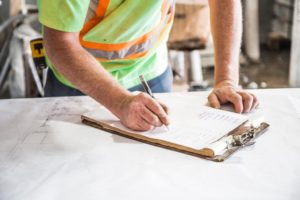The intention to introduce a domestic reverse charge for construction services was announced in 2017. The change will shift the responsibility for accounting for the VAT on ‘specified services’ from the supplier on to the recipient of the supply. The change will be implemented into law via SI 2019/892, amending VATA1994 Section 55A. The reason for its introduction is to tackle Missing Trader intra-Community (MTIC) fraud.
The key features of the changes are:
- Only standard rated and reduced-rated supplies are affected by the changes.
- The reverse charge will only be applicable on ‘specified services’ that fall under the reporting requirements of the Construction Industry Scheme (CIS).
- The reverse charge only affects ‘specified supplies’ made between VAT registered businesses.
- If your invoice consists of some CIS and some non-CIS supplies, your whole supply will be subject to the reverse charge.
- You will account for VAT in the normal way if you are making the supply to an ‘end user’.
- Sub-contractors are likely to become VAT repayment traders.
Your client is correct in that under certain circumstances they will not charge VAT on standard-rated or reduced-rated services.
This will be the case where they’re making supplies as a sub-contractor to a VAT registered main contractor. As the main contractor will be making onward supplies of building and construction services to the developer, your client is not supplying an end user, and therefore the domestic reverse charge will apply.
Work on new build dwellings which is zero-rated will be unaffected, whether your client is a sub or main contractor.
When your client acts as the main contractor on a standard-rated or reduced-rated project, and they are supplying consumers or final customers of building and construction services, these supplies are not subject to the reverse charge, and your client must charge and account for VAT in the normal way.
If your client is on the flat rate scheme, they should not include reverse charge supplies in their Flat Rate turnover. If a significant number of their supplies are subject to the reverse charge you may need to review whether it is still beneficial for them to remain on the scheme, as they will still be subject to the input tax restrictions of the scheme.
Should they receive any reverse charge supplies whilst on the flat rate scheme, again these should be dealt with outside the scheme, meaning the client will account for the VAT to HMRC, but will be able to credit themselves with the input tax (as long as they are fully taxable).
HMRC have said they will apply a soft touch approach towards errors for the first 6 months whilst traders get used to the changes and they have now published further detailed guidance on 7 June 2019 – VAT: domestic reverse charge for building and construction services.
